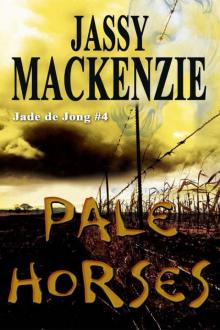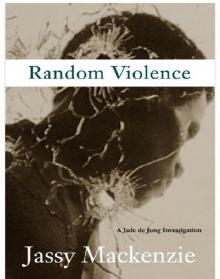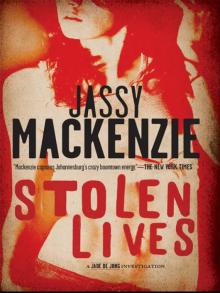- Home
- Jassy Mackenzie
Bad Seeds Page 5
Bad Seeds Read online
Page 5
“Do you have any Tabasco?” she asked the barman, and waited while he got her a bottle.
“Hot sauce improves most things.”
The voice was Botha’s.
She turned to see he’d packed up his computer and was standing behind her. His whiskey glass was still half full. He’d been nursing it. Not a habitually heavy drinker, it seemed, but she’d have to watch him carefully. Why else would he have lost control, assaulted a woman and smashed up a bar’s worth of furniture?
“You’re right,” Jade agreed with a smile. Then she let herself look at him more carefully, frowning slightly as if trying to place who he was. “We spoke at the motel, right?”
“Yes. I asked you what was happening in room twelve. You said there’d been a double murder.” Botha glanced around the almost-empty pub as if that fact might go some way toward explaining its lack of business.
“Two dead bodies. Not necessarily a murder.” Jade shook salt over her fries.
“How do you mean?” Botha asked. He wasn’t sitting down. Instead, he was standing near the counter, at an angle that gave him a view of the other patrons as well as the door. Then he added, “I’m being rude. I haven’t introduced myself. Carlos Botha.”
His voice was deep, with little accent.
“Jade de Jong,” she replied.
He held out his hand, and Jade leaned over and shook it. His grasp was cool and firm, and his skin felt hard. In the past, Jade had shaken the hand of a black belt karate champion, ninth dan, who specialized in smashing concrete blocks with his limbs. His palm had felt like a piece of concrete—rough and callused. Carlos Botha’s hand wasn’t quite as tough, but it wasn’t far off, either.
She wondered if he ever smiled.
“Do you want another drink?” he asked.
“Thanks. White wine, please.”
He ordered wine for her and a ginger ale for himself.
Snapping open the soft drink can, he asked, “Did you know either of the victims?”
“No,” she said.
“Why were the police talking to you, then?”
“I saw the woman crash her car when she was trying to leave. And I was the first to discover the bodies.”
“What did you see?” Botha asked, his voice sharp. “How do you think it happened?”
Jade dunked the corner of her sandwich in a pool of hot sauce. She hadn’t expected Botha to be so interested in the murders. “There was a baseball bat on the bed. It’s possible he might have assaulted her with it and then slipped on the floor and hit his head.”
Jade watched carefully to see if Botha would react to the mention of assault, but he didn’t blink, simply listened intently. “He was an older man—in his sixties or seventies. She was much younger. The room was flooded with oily water. It was bizarre.”
“You sure that’s what happened?” Botha asked after a minute’s pause.
“If I’d been working the crime scene, I would have kept that scenario in mind,” Jade said carefully. “Sometimes the simplest explanation is the correct one.” She speared a slice of tomato and stabbed her fork into a crisp lettuce leaf.
“And how would you know that?” he asked.
He didn’t sound suspicious, just curious. At any rate, it was time to offer up the start of a cover story and see if he swallowed the bait.
“I do investigation jobs from time to time,” she said. “I work with the police. I’ve seen crime scenes before.”
Now his gaze held hers like a magnet. “Is that why you’re here now? On a job?”
Jade offered him a reluctant half-smile. “If I were working, I wouldn’t be drinking,” she said. “I was supposed to meet a friend here tonight. A detective.” She took another, larger sip of wine.
Mirroring her actions, Botha drank some more ginger ale. She wondered if he was going to eat at all. The only item in his wastepaper basket had been a water bottle.
“What brings you here?” she asked, deliberately changing the subject as if she didn’t want to talk about herself.
“Business meeting,” he replied. He glanced around the bar again.
“What line of work are you in?” She didn’t necessarily expect the truth, but it would be interesting to see what response he gave.
“Security.”
Honest, then, but no embellishment. Botha didn’t want to talk about himself. Jade barely had time to draw breath before he continued. “So tell me about your detective friend.”
“He’s married,” Jade said. “Unhappily. But he won’t leave his wife.”
In the past, she’d met Superintendent David Patel at places like the Best Western motel when he was on the way back from crime scenes. In shabby hotels and motels in decaying suburbs where rentals by the hour were more common than by the night. She’d waited for him in rooms with damp on the walls and threadbare sheets and cloudy window glass, the better to hide their actions from the outside world.
Not places she or David would have wanted to spend the night—but usually, they’d been done within the hour.
“Is he handling this investigation?” Botha’s gaze flicked in the direction of the motel.
“No. He’s a different division. Organized Crime.”
“And he stood you up?” The observation was more of a question.
She shrugged. “He couldn’t make it. Maybe tomorrow, he said. Maybe not. It goes with the territory.”
“What does?”
“Disappointment.”
And that was true, too.
Botha nodded but said nothing. She thought he believed her cover story, grounded in truth as it was. He shifted position, leaning back against the bar counter. He hadn’t stopped watching the room.
Jade had the sense that their conversation, such as it was, was over. Staying longer would send the wrong message and might make him even more suspicious. It was time to go back to her room and start listening in for his return. Tomorrow morning she would find a reason to knock on his door. “I guess I’d better get some sleep. Thank you for the drink.”
He raised his glass to her. “Nice meeting you.”
As she left, he called after her. “Jade!”
“Yes?”
“What room are you staying in?”
“Two.”
It was a sign he wanted to stay in touch. Perhaps tomorrow morning he’d be knocking on her door.
Crossing the road to the motel, Jade had the feeling he was watching her.
She let herself into her room, locked the door and undressed, folding her clothes over the back of the chair.
She stepped under the shower and turned it to its hottest setting, which was lukewarm, as she had expected. Life was full of disappointments.
And surprises.
Ten minutes later, she slid between the cool sheets of her bed and reached for the listening device on her pillow, planning to leave it on the table for the night.
But to her puzzlement, the light was flashing.
Botha wasn’t in his room. How was it possible that the bug had picked up sounds?
Her pulse quickening, she pressed play.
With the volume turned up as high as it could go, Jade listened to the rattle and crack of the lock, footsteps and muttered conversation that intruders had left on her listening device while breaking into Carlos Botha’s motel room.
Chapter Eight
Superintendent David Patel felt as if his head was going to explode. Taking a break from the relentless glare of his computer screen, which had recently developed a migraine-inducing flicker, he rested his forehead in his hands and massaged his temples with his thumbs.
It wasn’t just the screen that was giving him brain-bleed. It was the thought of his massive caseload. There were innumerable crises clamoring for his attention. He’d had one of those days where the phone hadn’t stopped ringing, with some hi
gh-level government official on the other end lambasting him and his team for not having done what was (usually) the official’s job.
Another two rhinos had been killed and dehorned. The public was frothing about it. One woman had taken it upon herself that afternoon to personally picket the front entrance of the police station, waving a banner with illegible lettering scrawled in red paint, together with a hand-drawn picture of what looked like a dog with a sausage sticking out of its forehead.
David was as sorry for the rhinos as anybody, but for Christ’s sake, Organized Crime couldn’t allocate a personal guard for each and every one of them. They were doing their job, they had suspects behind bars, dockets prepared by sleepless officers at the end of double shifts . . . It wasn’t their fault that new, different poachers had slaughtered two more of the poor animals the previous day. Give the police a break!
And now there was the outcry over the nuclear deal with Russia that President Zuma had announced. Six new power stations providing electricity the country desperately needed, but in a form the population really didn’t want. Everybody knew about Chernobyl. Even people who couldn’t find Russia on a map were suddenly experts on it. And an incident of sabotage at Inkomfe had just been reported. The docket hadn’t been handed over to his department . . . yet. He was waiting for somebody to decide this was, in fact, organized crime.
Meanwhile, the police were battling to do their jobs, thanks to the rolling blackouts crippling the country as outdated equipment, inefficiently maintained for the past twenty years, finally stopped working. Coal silos were collapsing. Transformers were giving up the ghost.
The building where David worked had one generator, which was often out of fuel and only big enough to power the emergency lights and the central database server. Everyone else had to sit in semidarkness staring at their blank screens, or go the old-fashioned route and do some paperwork.
Never had David’s filing been so up-to-date, but filing alone didn’t solve crime. They needed to be fully powered up at all times. He needed some power, any power. He didn’t really care what kind it was. Coal, solar, wind, nuclear . . . just having the lights on consistently, the computers working and being able to boil a kettle would be a good start.
His attention was brought back to the present by a knock on his door.
Turning, he saw with surprise that it was Commander Ward, his immediate superior who headed up the Organized Crime unit.
“Commander,” he said, hastily unfolding himself from his chair and striding across the room.
“Patel,” the commander replied. “I have a serious problem on my hands. There’s something I need your team to investigate urgently.”
“Of course,” David said, feeling his blood pressure rise as he thought of his impossible caseload. “What is it?”
“I’ve received a heads-up from my contact in the FBI.”
“Yes?” Oh, God, this involved the FBI? David could visualize all his available time being sucked into the vortex this new case would create.
“As you’re aware, there is a list of known terrorist sympathizers they keep tabs on.”
“Yes, Commander.”
“We’ve been warned that one of these sympathizers may have traveled to South Africa recently, or be arriving here in the very near future.”
David stood up straighter, looking down at the shiny, balding pate of his superior as he took a folder from his briefcase. “Who is he?”
“His real name is Rashid Hamdan. He’s based in the Middle East, mainly in the Emirates and Iraq, according to their intel. He owns a string of casinos and other businesses, and is suspected of laundering money for certain extremist groups, including ISIS. He was banned from entering the United States a few years ago, and his name is on our watch list as well, but he is known to have multiple passports in other names and nationalities. There’s a description of him in the folder. He’s forty-eight years old. May have had facial surgery in the past few years. Brown eyes, dark hair, though he has been known to dye it other colors or shave it. He’s five-nine, average build.”
“So we’re looking for a guy with brown eyes, basically?” David asked.
The commander frowned, as if he suspected David was being facetious. “There are some old photographs of him in the file, and on this USB device.”
“Any idea when he arrived here?”
“He’s either traveled here in the last week, or is planning to arrive within the next day or two. He is flying, or has flown, from the Middle East.”
Guy with brown eyes, who may or may not have landed from one of over fifty possible flights. Great. “Do you know why he’s traveling here? Who he was going to meet?”
“Superintendent, all the information we have is in the folder.”
The very slim folder.
“Read through it and put a task team together as a matter of urgency,” the commander continued. “I would start by circulating the photograph to all border control officials, and to the major hotels as well. This man is on the FBI’s wanted list. We need to be seen to be taking positive action here.”
“Understood, Commander,” David said.
Perhaps the only hint that his commander had given as to the futility of the exercise lay in the words “be seen to be taking.” Well, David would do his bit. He’d be seen putting a task force together, and be seen circulating the photo as the commander asked. And if the FBI’s reliable contact came back with any real information, David might even be seen as striking a blow against terrorism by actually arresting the man.
He could only hope.
Chapter Nine
Intruders had broken into Carlos Botha’s motel room.
Sitting bolt upright in her bed, Jade watched the recorder in the same way she supposed a wary horse might watch a flapping piece of plastic. Her body tensed, her gaze fixed on the device as if, by looking hard enough, she might be able to see who was trespassing in his room and why.
Had Gillespie hired a second investigator without telling her? If that was so, she didn’t mind. But the longer she listened, the more she began to think this theory was wrong.
She had heard the intruders entering.
But no matter how hard she listened, she could not hear them leave.
The lock had been forced open, and the hinges had creaked when they arrived. She’d heard the door close. Then she had heard movement and low voices.
Then silence.
No sounds of anybody searching the room. No squeak to tell her the door had been opened again.
Five minutes passed, then ten.
Only one possible explanation—they were still there, waiting for him.
Jade eased herself off the bed and got dressed again. She left her room quietly, locking the door behind her. Then she followed the path to the southern wing of the building.
From the outside, room number nineteen looked peaceful. Door closed, no lights on that she could see. Botha’s Porsche was where he’d left it, with no other cars nearby. She made her way carefully over to it. Was somebody hiding in or under it?
She bent down to look.
Nobody underneath. Just an acrid smell that was tickling her nostrils.
Probably Botha needed to get his Porsche serviced.
Jade walked around to the back of the building. Her feet trod on blacktop, then concrete paving, then over gravel half-smothered by grass. She saw peeling plaster and smelled a whiff of drains. This was the ugly back view of a building whose front was not exactly beautiful to start with.
The windows of number nineteen had the curtains drawn, and there was no light behind them. A legitimate visitor would surely have turned a light on.
Jade let out a slow breath, biting her lip in indecision. She was hired to investigate, not to interfere.
And yet you couldn’t question a dead man.
Okay, then. Plan-making time
. Somehow she needed to warn Botha about this.
But when she walked back the way she had come, she saw that the neon Heineken sign in the pub’s window was switched off, and its door was shut.
Closing time had come and gone.
Where was Botha? Had he gone to reception for some reason? She jogged to the office, only to find that it, too, was locked up tight.
She had no idea where he’d disappeared to. His car was still parked outside. She’d have to go back to her own room and watch for him through the window.
Jade walked back. She was unlocking her door when she sensed movement in the shadows nearby. She froze, listening, and then jumped when she heard a voice, hard and deep.
“Jade.”
She spun around, her heart pounding.
Botha was standing in the shadows. He must have been waiting for her.
“What do you want?” she said. Her voice was high. She couldn’t stop thinking about what Gillespie had said, about the malicious damage and Botha assaulting a woman.
He moved closer, as if her words had given him permission. “I want to speak to you.”
“About what?” She could see he’d picked up on her tension, that he realized how off-balance he’d thrown her.
“I thought you were in your room. I knocked a minute ago, and I didn’t know if you’d heard me,” he said.
“I went to the office to see if they had cockroach spray, but it was shut,” she lied. She turned away from him, unlocked the room, switched the light on.
He followed her in, and she closed the door behind them.
In the uncompromising harshness of the room’s light, she thought Botha looked not just tired but deeply exhausted. Shadows underscored his eyes, and the frown lines between his eyebrows spoke of sleeplessness and stress. He looked older than she’d first thought. She guessed he must be in his early forties.
First thing: the listening device. It was on her bedside table with the volume turned up. She desperately needed to mute it and hide it away without Botha noticing.
“Could you put the kettle on?” she asked, and while he busied himself with filling the small plastic kettle, she turned the device to silent and slipped it under the pillow. Then she tipped a sachet of instant coffee into each of the two small mugs.

 Pale Horses
Pale Horses Bad Seeds
Bad Seeds Random Violence
Random Violence Folly
Folly Stolen Lives
Stolen Lives The Fallen
The Fallen Soaring
Soaring Drowning
Drowning